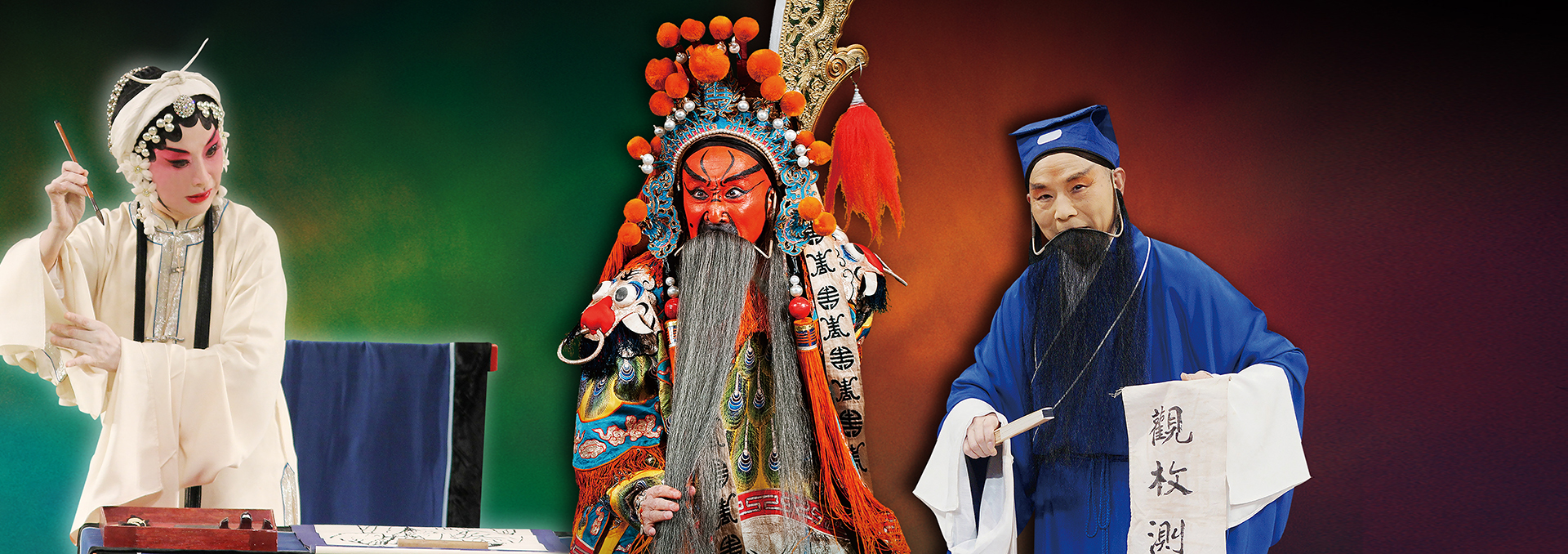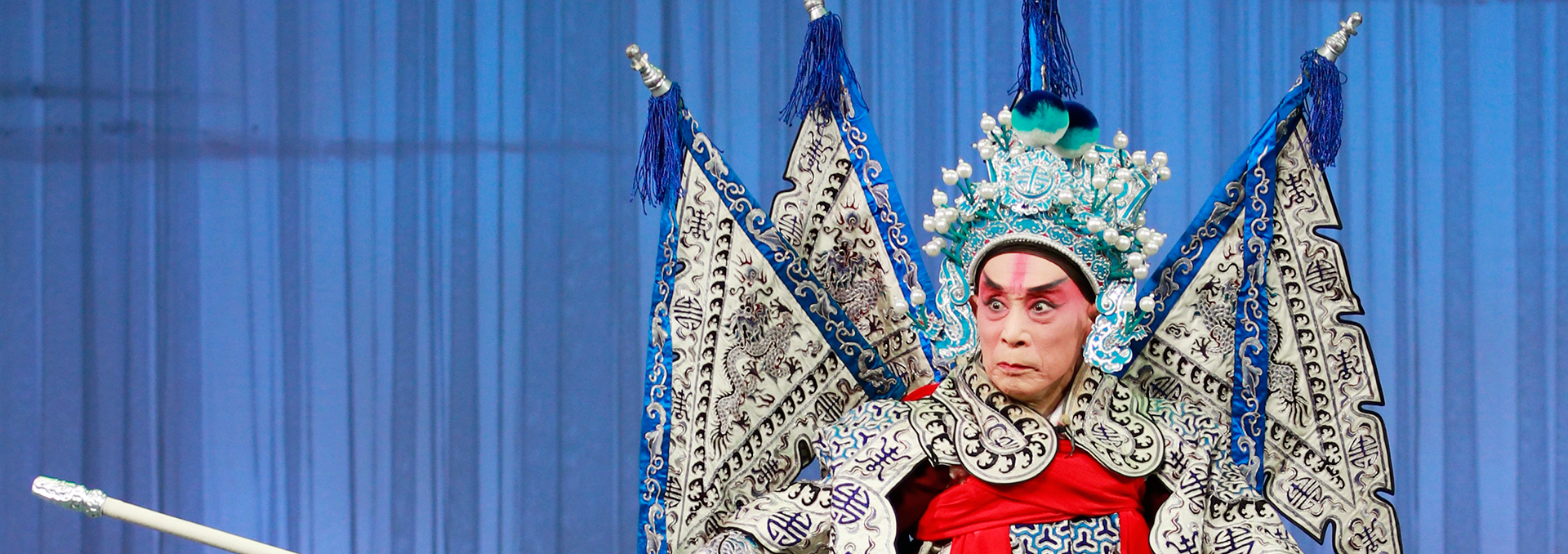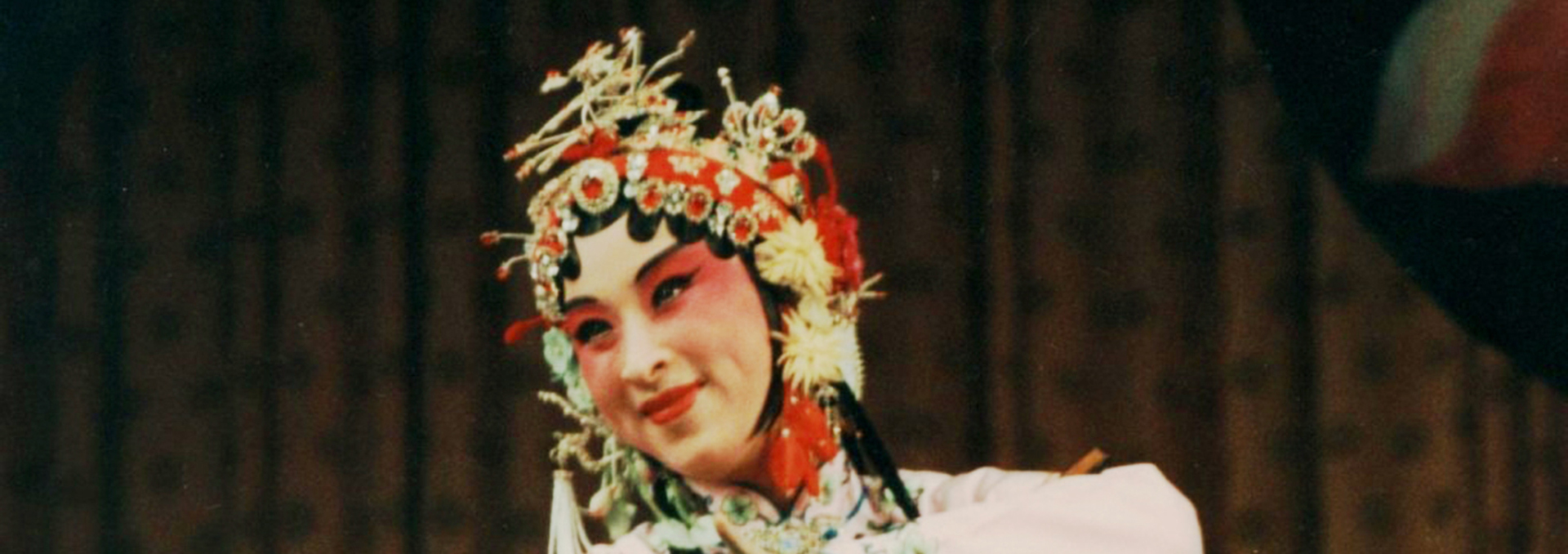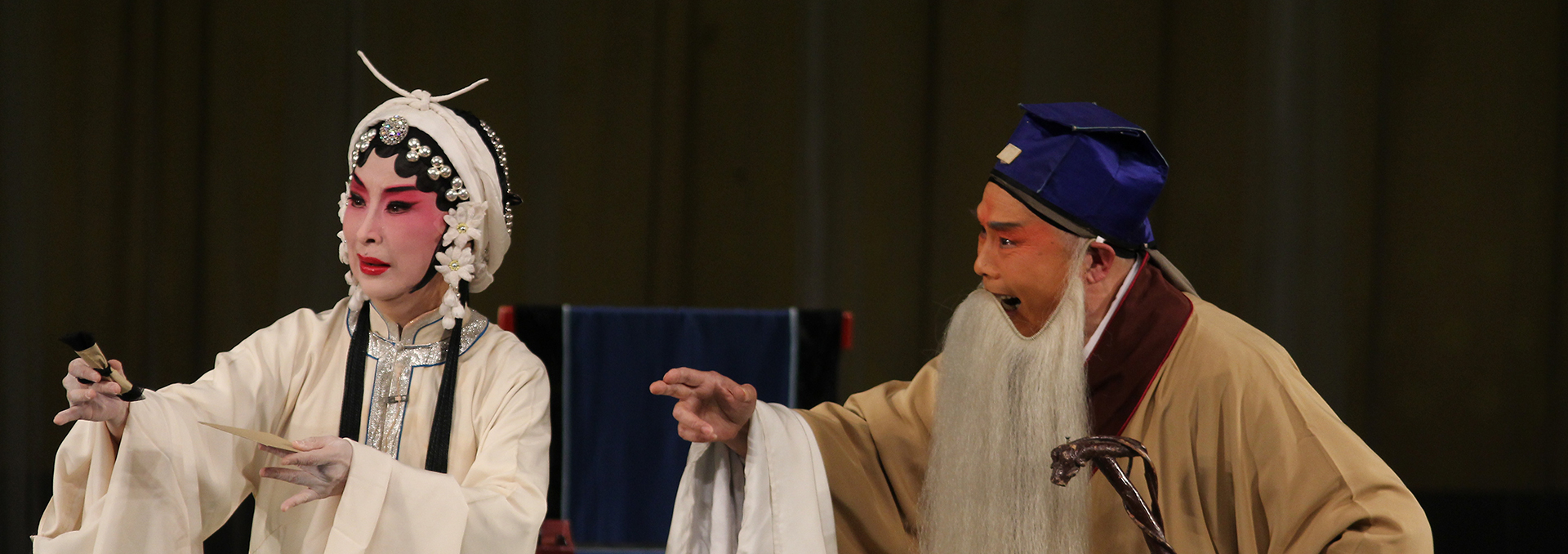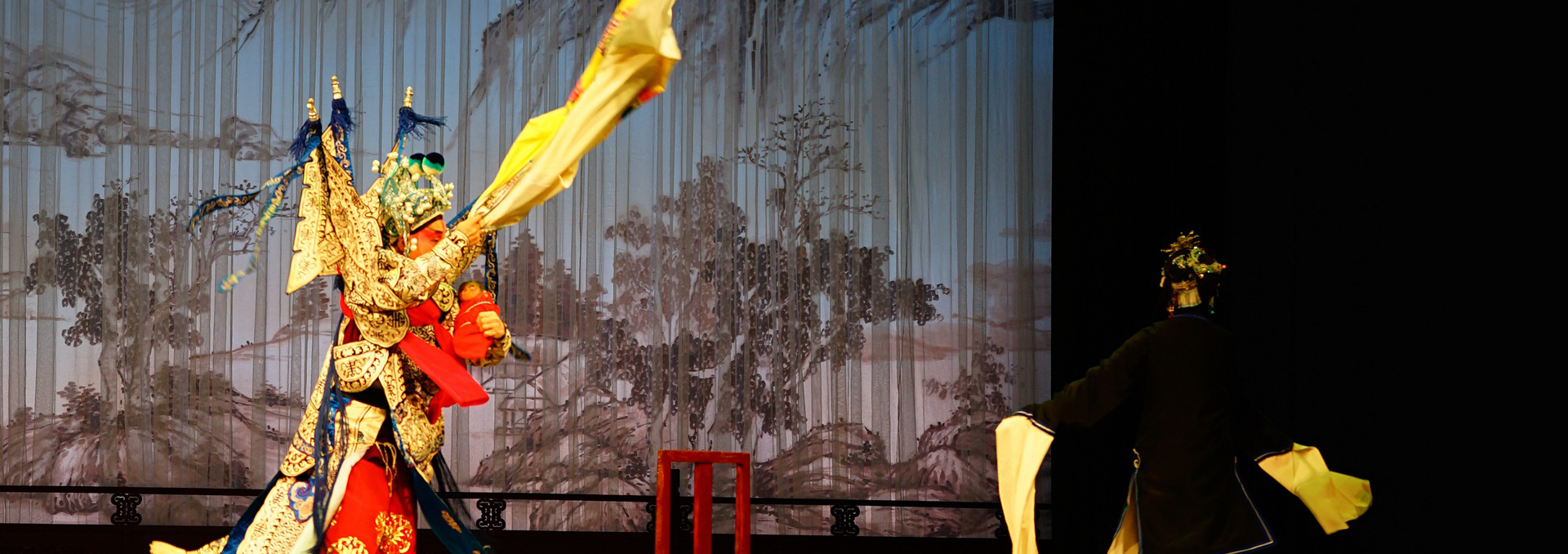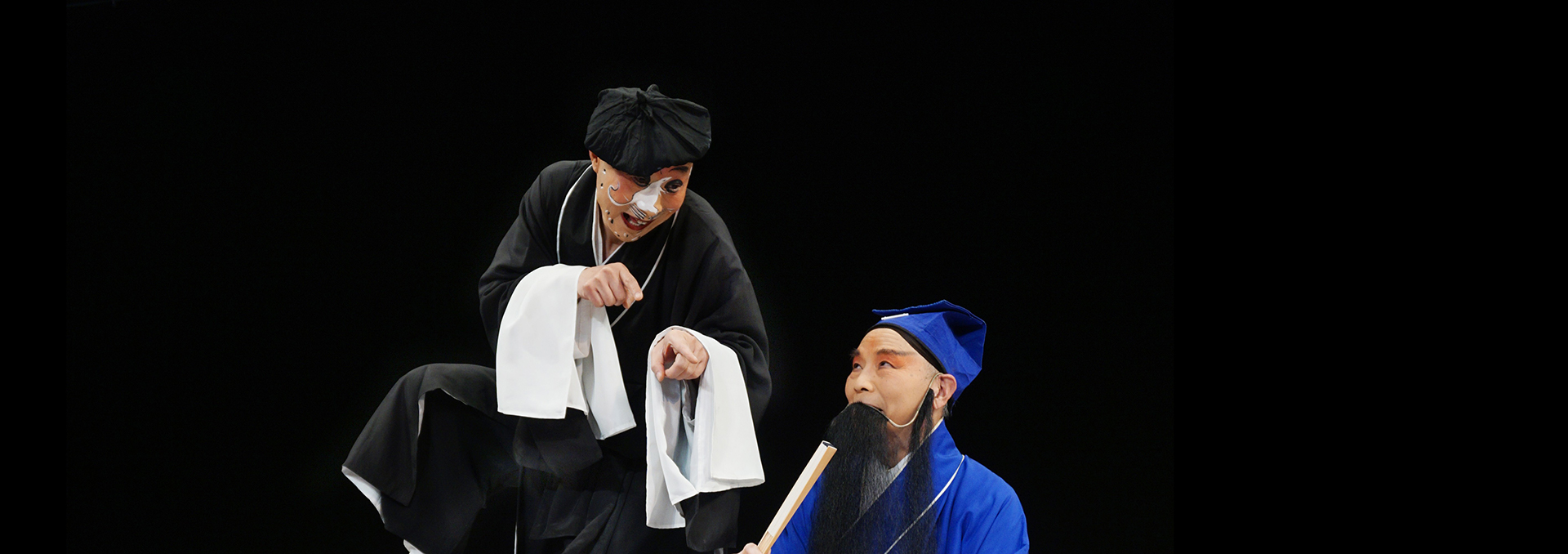
Jingkun Theatre & Shandong Peking Opera Theatre -
Three Maestros in Peking Opera and Kunqu Opera
Introduction
Peking and Kunqu Operas are all about the art of the performer.
On stage, nothing can take the place of the performer’s skills and acting. The artistic merit of a real master will not fade with time, nor will it lose any of its brilliance from being something of pure simplicity.
The performance title meaning “Everlasting Glow of a Flawless Jade" is a metaphor to describe the exquisite art and skills of great artists in Chinese theatre, which have been hammered, seasoned and polished for generations to become as precious as an unblemished jade and as perpetual as mother nature. Through the great masters' performance, we can appreciate the true essence of Chinese theatrical art. The present production featuring Li Yusheng, Tang Yuen-ha and Lu Yongchang is one such valuable opportunity.
This is a very rare collaboration. Tang Yuen-ha, Hong Kong's very own Peking and Kunqu Opera artist, will team up with Peking Opera grandmaster Li Yusheng and iconic Kunqu Opera performing artist Lu Yongchang to perform with Shandong Peking Opera Theatre - one of the national key troupes of Peking Opera by the Ministry of Culture of China. They will be presenting a list of classic Peking and Kunqu Operas excerpts.
Li Yusheng is a celebrated wusheng (military male) and hongsheng (red-faced male) performer. His performance has already reached a stage of total freedom, and yet not a single movement is beyond the laws of art. His wusheng performance is characterized as "simple and beautiful, speedy and steady, brisk and graceful, gentle and powerful”. His acting in Guan Yu plays could bring out the boldness and vigour of the old general and touch the heart of the audience. In 1989, The Death of Yang Zaixing at River Xiaoshang, a play that he personally arranged and performed, was listed as a grand wusheng performance art model and an exemplary repertoire in China's "Quintessential Peking Opera Series".
Tang Yuen-ha is a hall-of-fame Peking Opera and Kunqu Opera art performer in Hong Kong. She is the only Hong Kong artist to have won the Plum Blossom Award for Chinese Theatre, the highest honour in the Mainland for theatre workers. Her performance is like a breath of fresh air, which is also authentic and eloquent. Tang is reputed as "the Pearl of Peking Opera and Kunqu Opera of Hong Kong”.
Lu Yongchang is a role model for laosheng (old man) in Kunqu Opera. His unrestrained performance always brings the character to life. He has unparalleled singing and reciting skills. He plays Chen Zuiliang in the master's version of The Peony Pavilion.
This performance will be a classic amongst classics.
Jingkun Theatre & Shandong Peking Opera Theatre -
Three Maestros in Peking Opera and Kunqu Opera
Programme Details
Auditorium, Kwai Tsing Theatre
8/7 Sat 7:30pm
Excerpts
Peking Opera The Crossroads
The Crossroads, a classic repertoire of wusheng (martial male) and wuchou (martial clown). It is also a model play in the art of Peking and Kunqu Operas for using virtual performance skills to create an objective environment. The full script consists of merely 100 words. The set is so simple that there is only one table to symbolize the bed. The story is set in an indoor environment and takes place at midnight. However, the stage is brightly lit.
The play requires the actors to perform highly difficult routines and work with good coordination in order to perform the groping, prying, speculating, and even combating sequences in the dark.
Featuring the artistic merits of both wusheng and wuchou on the same stage, the expression of darkness in brightness is the most intriguing aspect of this play.
During Northern Song, Jiao Zan, a fierce warrior of the Yang’s army is sent into exile because he offended a treacherous minister. The chief commander Yang Liulang demands his deputy Ren Tanghui to secretly protect Jiao Zan. By the time Jiao Zan reaches the crossroads, knight-errant Liu Lihua mistakes Ren Tanghui as an assassin sent by the treacherous minister. Both men are supposed to be protecting Jiao Zan, but they enter into a fight in a dark room…
Cast
Ren Tanghui: Song Bolong
Liu Lihua: Wu Shichao
Jiao Zan: Jin Zhiyong
Wife of Liu Lihua: Sun Ming
Two officials: Zhang Guizhou, Li Kai
Bangu: Li Xun
Peking Opera The Teahouse from The Story of the Iron Bow
The actress playing Chen Xiuying first performs the role of huadan (female lead) and then wusheng (martial male) in the full-length play The Story of the Iron Bow – a performance that is highly challenging. Tang Yuen-ha won the 8th Plum Blossom Award for Chinese Theatre with this play. Tang acted with finesse by her singing, reciting, gesturing and performance skills in The Teahouse. Through the incisive expression of serving tea, bickering with the mother and sparring with Kuang Zhong, Tang brings an innocent, adorable, bright and daring young girl to life with ease and verve.
Wang Yujin, the renowned clown actor playing the role of the mother, is reaching 80 years old. His performance is impeccably vivid. Tang and Wang have been long-term stage partners and their collaboration earned the 8th Plum Blossom Award. The two actors are seamless in this play.
Chen Xiuying is the daughter of the late military officer of Taiyuan. She is young, pretty, a fine martial artist and runs a teahouse with her mother. One day, the son of the Brigade General, Shi Lun, comes to the teahouse. Taking advantage of his father’s influence and seeing the beauty of Xiuying, Shi Lun attempts to force her into marriage. Chen’s mother is furious and drives him away. Mrs. Chen meets young and righteous Kuang Zhong when she drives Shi Lun away. Kuang Zhong calms down Mrs. Chen and she is impressed by his integrity. Mrs. Chen invites Kuang Zhong to the teahouse and Xiuying falls in love with Kuang Zhong at first sight. Before Xiuying’s father passed away, he insisted that the man who could draw the Iron Bow, a family heirloom, would win his daughter’s hand. Kuang Zhong manages to draw the bow. Xiuying spars with him. She is even more impressed with his personality and martial skills and is then gladly engaged to Kuang Zhong.
Cast
Chen Xiuying: Tang Yuen-ha
Mrs. Chen: Wang Yujin
Kuang Zhong: Pan Deyao
Shi Wen: Yao Zhigang
Ugly attendant: Liu Guihua
Four servants: Wu Gang, Yang Yapeng, Yuan Xuening, Liu Xianyong
Bangu: Li Xun
Jinghu: Ji Leiguang
– Intermission of 15 minutes –
Kunqu Opera An Investigation in Disguise from Fifteen Strings of Coins
The story is from a Ming dynasty writing, Stories to Caution the World by Feng Menglong, which was later adapted by Qing dynasty writer Zhu Suchen into the tale The Dream of Xiong Youlan and Xiong Youhui. The story has been adapted by different Chinese opera genres. In 1956, the story is premiered by Zhou Chuanying and his fellow “chuan” generation Kunqu Opera masters in Beijing and it had shocked the whole country. It is reputed as “the one play that saved the genre”, meaning its brilliance revived Kunqu Opera.
The play has many twists and turns that excites the audience. The excerpt of An Investigation in Disguise is the classic of classics. Kuang Zhong is very witty and heuses the character “shu” (mouse) as the icebreaker in the fortune tellingsession. He asks questions on the number of strokes, eight trigrams, thefive elements and a set of fortune teller’s formulas to test the suspect.Lou Ashu has a guilty conscience – he jumps up and down like amouse. The play interestingly contrasts an officer with a suspect, ahandsome man with an unattractive one, as well as an upright personand an evil man.
During the Ming dynasty in Wuxi, gambler Lou Ashu stole, killed and falsely accused another person, resulting in the innocent being sentenced to death. Kuang Zhong, the officer who oversees the execution, senses injustice in the case and fights for suspending the execution. After investigation, a lead is found on Lou Ashu by Kuang Zhong. Kuang Zhong first disguises himself as a fortune teller and tries to get Lou Ashu speak of his evilness at the temple. He next brings him back to the tribunal for cross-examination. The truth is finally revealed. The real criminal gets his punishment and justice is served.
Cast
Kuang Zhong: Lu Yongchang
Lou Ashu: Lu Fuhai
Bangu: Li Xun
Dizi: Su Zhenguang
Peking Opera Covering the Well from The Battle of Changban Po
Legend has it that Changban Po was where Zhao Zilong saved his child lord and demonstrated his military prowess. The story originated from “Liu Bei Leads His People Over the River; Zhao Zilong Rescues the Child Lord at Dangyang”, chapter 41 of Romance of the Three Kingdoms. The renowned excerpt Covering the Well is a classic collaboration between Yang Xiaolou and Mei Lanfang.
Zhao Zilong is very impatient in this play, but his disposition as a commander and his manners as a lord’s minister are not compromised. The performance of this role is representative of the art of martial finesses and superior singing of the Yang school wusheng (martial male). The reciting of Li Yusheng is exemplary for this generation. The conclusion has incorporated a combat sequence with the Cao army, which underscores Li Yusheng’s attainments, the beauty of stylised movements and finesse in martial and dance skills.
Madame Mi, as performed by Tang Yuen-ha, is dignified and graceful. The traditional singing and reciting skills of qingyi (virtuous female) are showcased in the performance. The highlights of the dan (female) role of this play are manifested in the arrow routines, as well as the sequence that accompanies Zhao Zilong’s “cape-grabbing”.
During the Three Kingdoms Period, Liu Bei stations at Jiangxia. He is welcomed and accepted by tens of thousands of ordinary people. The Cao army catches up. Liu Bei and his family are lost in the military chaos. Madame Mi takes Dou Guan into her arms and flees with fellow villagers. She is shot by an arrow and falls down. She hides herself behind the broken wall. Zhao Zilong finds the madame and his young lord. Knowing she can hardly survive her arrow wound, Madame Mi wishes to entrust Dou Guan with Zhao Zilong, so that she will not become a burden to Dou Guan. Zhao Zilong declines and tries to convince Madame Mi to get on the horse, while he fights on foot. Madame Mi does not really have other choice, she puts Dou Guan into the hands of Zhao Zilong before she turns her back and jumps into a well to end her own life. Zhao Zilong tries to stop her, but it is already too late. He could only break the broken wall apart to cover the well and bury the body. He puts Dou Guan inside his amour and fights his way out of the dangerous encirclement.
Cast
Zhao Yun: Li Yusheng
Madame Mi: Tang Yuen-ha
Zhang He: Zhang Hongjian
Two generals: Jin Zhiyong, Xing Yuliang
Four killers: Zhang Liming, Wang Wei, Mu Xinyuan, Sun Kai
Bangu: Dong Xin
Jinghu: Ji Leiguang
The running time of the performance is approximately 3 hours including an intermission of 15 minutes.
Auditorium, Kwai Tsing Theatre
9/7 Sun 7:30pm
Excerpts
Peking Opera Fighting in the Melon Garden
Fighting in the Melon Garden is a classic wuchou (martial clown) play. Pairing with the chou (clown) role is the martial painted face of the jing (painted face) specialism. A born handicapped old man and a very unattractive strong man bring out the beauty of the clown role in the art of Peking Opera and Kunqu Opera through heated martial sequences and hilarious punch lines.
Tao Hong is a white-haired hermit born with various disabilities – he could not straighten his left arm or open his hand; he has a crippled left leg and a hunchback… Throughout the performance, the actor must demonstrate his fist and leg works under such special conditions. The demanding techniques, thus, made this a “must-perform” martial play for wuchou actors.
Five Dynasties. Zheng Ziming is an oil peddler. One day he passes by Tao Hong’s manor and he picks some melons that are growing inside it. Tao’s maid finds out and reports it to Tao’s daughter San Chun who then engages in a fight with Zheng. When Tao Hong arrives, Zheng takes him lightly as Tao is crippled and old. Surprisingly, Zheng is defeated by Tao. Admiring Zheng’s bravery, Tao betroths his daughter to him.
Cast
Tao Hong: Wu Shichao
Zheng Ziming: Zhang Hongjian
Tao Sanchun: Sun Ming
Maidservant: Liu Guihua
Four children: Yang Yapeng, Wu Gang, Yuan Xuening, Sun Weian
Bangu: Li Xun
Jinghu: Ji Leiguang
Kunqu Opera Painting the Portrait and Bidding Farewell at the Grave from The Story of the Lute
The zhengdan (virtuous female) role in Kunqu Opera is also known as “female painted face”. The specialism is best known for its distinctively euphonious singing voice that combines both sonorous and bass techniques. Painting the Portrait and Bidding Farewell at the Grave are both performed by a zhengdan and a laosheng (old male). Although they do not involve grand production sets, the subdued emotions stirring in the hearts of the characters must be gradually unfolded for the audience. The play is subtle, deeply emotional and compelling. The singing and reciting demonstrate the impeccable enunciation and voicing skills of performers.
Cai Bojie went to the capital city to attend the imperial examination without returning home for three years. His homeland was struck by a serious drought and his parents passed away during the famine. After burying her parents-in-law, Zhao Wuniang wanted to go to the capital city to find her husband. Before she left home, she drew a portrait of her deceased parents-in-law in tears and brought it with her. She also entrusted the care of the grave of her parents-in-law to old Master Zhang. Wuniang and Zhang bade farewell to each other in tears before the grave. Taking her lute with her, Wuniang begged all the way to the capital city.
Cast
Zhao Wuniang: Tang Yuen-ha
Elder Zhang: Lu Yongchang
Bangu: Dong Xin
Dizi: Su Zhenguang
– Intermission of 15 minutes –
Peking Opera The Defeat at Maicheng
Guan Yu has always been considered a person with superior human qualities in the Chinese society and is revered as a deity. During the reign of Qianlong of the Qing dynasty, the imperial court compiled the script Confrontation in the Spring and Autumn Period, a full-length play about the Three Kingdoms. Whenever Guan Yu appears, even kings and his consorts need to stand up in respect.
Guan Yu plays are also known as the act of hongsheng (red faced male). Li Hongchun is the personally instructed disciples of Wang Hongshou (stage name San Mazi), the pioneer of hongsheng. Honouring his outstanding virtuosity, Li Hongchun is reputed as the grandmaster of the hongsheng role and Guan Yu plays. The performer of Guan Yu, Li Yusheng, is the son and disciple of Li Hongchun. Li Yusheng has inherited the finest skills from his father and he is also a graduate from Modern Art Academy (now the National Academy of Chinese Theatre Arts). Although he is over 70 years old, his performance is no less powerful. The lingering charm of his acting has in fact become much intense and rightfully deserves the title of the best hongsheng of our time. All his gestures, reciting and use of singing voice demonstrate the extraordinary strength and majestic presence of Guan Yu, as well as thedesolation and sadness of a hero during his final moments.
During the Three Kingdoms period, Liu Bei invades into the state of Shu. Guan Yu is guarding Jingzhou. Guan Yu is strong, arrogant and impolite to Eastern Wu. The states of Wei and Wu joined forces to fight. Guan Yu lost because he underestimated his enemies. Guan Yu hastily retreats to Maicheng. Zhuge Jin is instructed to convince Guan Yu to surrender, but Guan Yu declines with harsh words. Lu Meng, a Wu commander, treats the ambassador of Shu with favour, which affects the morale of Guan Yu’s troop. There is no food in Maicheng and there is no backup from outside of the city. Guan Yu instructs Liao Hua to go to Shangyong to deploy troops. The defence commander Liu Feng and Meng Da have grudges with Guan Yu. They ignore the begging of Liao Hua and decline to send back up army. Guan Yu has no choice but to break out of the encirclement. A snowstorm is falling, Guan Yu, Guan Ping, Zhao Lei and other commanders exit from the north gate to route to Xichuan. The Wu army has set up an ambush. Yu and others are captured alive by commanders of the Wu state.
Cast
Guan Yu: Li Yusheng
Guan Ping: Song Bailong
Zhou Cang: Hu Dongsheng
Wang Fu: Zhang Guohui
Zhao Lei: Pan Deyao
Liao Hua: Zhang Bin
Ma Liang: Lu Wenxue
Xu Huang: Zhang Hongjian
Lu Meng: Zhang Liming
Zhuge Jin: Sun Weian
Liu Feng: Wang Menghui
Meng Da: Zhang Fuzhan
Stable boy: Yang Yapeng
Herald: Yao Zhigang
Scout: Liu Guihua
Eight killers: Li Kai, Cui Jingqiang, Wang Jingrong, Du Xin, Zhang Jilei, Li Jun, Wang Wei, Sun Kai
Eight soldiers: Jin Zhiyong, Xing Yuliang, Yuan Xuening, Li Wenxue, Wu Shichao, Zheng Hongkui, Mu Xinyuan, Wu Gang
Other soldiers: Zhang Guizhou, Xiao Jitai, Zhang Shaomin, Liu Xianyong
Bangu: Dong Xin
Jinghu: Ji Leiguang
The running time of the performance is approximately 3 hours including an intermission of 15 minutes.
Information provided by Jingkun Theatre and Shandong Peking Opera Theatre
Jingkun Theatre & Shandong Peking Opera Theatre -
Three Maestros in Peking Opera and Kunqu Opera
Performing Group
Jingkun Theatre
Established in 1986, Jingkun Theatre is a company dedicated to the development and promotion of Peking Opera and Kunqu Opera. Over the years, it has produced and organized various kinds of performances, talks, workshops and courses. Recent major productions include The Exquisite Charm of Peking Opera and Kunqu Opera; Three Stars in Peking Opera, Plum Blossom Award Winning Showcase and Yu Zhenfai and His Artistic Lineage in the Chinese Opera Festival. Earlier productions include the Peking Opera Concert which showcased the various vocal styles and traced the development of Peking Opera in the last hundred years, The Great Belfry which was a Chinese Opera adaptation of The Hunchback of Notre Dame by Victor Hugo, and The Return of the Condor Lovers which was based on the novel of the same title by Louis Cha.
Jingkun Theatre was invited to represent Hong Kong in the China Peking Opera Festival held in Nanjing in 2001, and the China Kunqu Opera Festival held in Suzhou in 2006. In 2007, it was invited to represent Hong Kong and the Peking Opera genre in the 3rd Festival of Traditional Chinese Opera in Paris, and won the Prix Special du Jury (Special Jury Prize) and the Best Actor Award. Apart from performances and creative production, Jingkun Theatre has also conducted arts education and guided appreciation sessions for primary, secondary and university students in Hong Kong. Over the years, Jingkun Theatre has been invited to give seminars, workshops and demonstrational performances at the universities in the United Kingdom and Australia.
Website: www.jingkun.org.hk
Facebook: www.facebook.com/JingkunTheatre
Shandong Peking Opera Theatre
Shandong Peking Opera Theatre was established in 1950. Over more than half a century, the company has bred a large number of artists who have achieved both artistic and moral excellence. Over the years, the company has successfully produced new works such as Raid of the White-tiger Regiment and Red-clouded Hillock; both were later made into films. Shilong Bay won the Cheng Changgeng Bronze Medal in the 1st China Peking Opera Festival and an award for new repertoire in the 6th Wenhua Performance Award. The Overlord in the Spring and Autumn Period received an Outstanding Repertoire Award in both the 7th China Theatre Festival and the 3rd China Peking Opera Festival, and a new repertoire award in the 11th Wenhua Performance Award. Railroad Guerrillas won the Class One Award in the 5th China Peking Opera Festival. The Sacrifice of an Iron-willed Confucius Scholar received the 6th China Peking Opera Festival Silver Award. Rui Fu Xiang was showcased at the 10th China Peking Opera Festival and won the Grand Prix (top of the honour roll) in the 14th Wenhua Performance Award. Apart from touring around the country, the company has also visited many overseas countries as a cultural representative. Its footsteps have traversed countries and places all over Europe and Asia.
Jingkun Theatre & Shandong Peking Opera Theatre -
Three Maestros in Peking Opera and Kunqu Opera
Production Team
Director: Tang Yuen-ha, Zheng Shaohua
Coordinator: Lau Lai-lai, Zhou Xiang, Sun Youhao
Stage Manager: Xiao Jitai, Zhang Fuzhan, Zhang Guizhou, Yao Zhigang, Yang Yapeng, Mu Xinyuan
Musicians
Bangu: Dong Xin, Li Xun
Jinghu: Ji Leiguang
Dizi, Daruan, Suona: Su Zhenguang
Jingerhu: Man Yi
Sheng: Zhuang Zhong
Yueqin: Xu Chunhua
Sanxian: Zhou Lei
Yangqin: Mou Ni
Zhongruan, Erhu: Li Pei
Daluo (Large Gong): Sun Youhao, Mou Sai
Cymbals: Li Changhai
Xiaoluo (Small Gong): Gao Liang
Stage Art Team
Costume: Wang Li, Zhang Guoqing
Props: Cheng Liqiang
Make-up: Kang Qing, Gong Mingming
Wardrobe: Tian Qinghua, Zhang Shaomin
Video Recording: Zhang Xu
House Programme Information and Surtitles Translation: Multilingual Translation Services, Jacqueline Sin
Jingkun Theatre & Shandong Peking Opera Theatre -
Three Maestros in Peking Opera and Kunqu Opera
Ticketing
Auditorium, Kwai Tsing Theatre
8-9/7 Sat-Sun 7:30pm

 $380
$380  $300
$300  $220
$220  $150
$150
With Chinese and English surtitles
Please refer to the "Extension Activities" page for details of extension activities
Programme Enquiries: 2268 7325
Ticketing Enquiries: 3761 6661
Credit Card Telephone Booking: 2111 5999
Internet Booking: www.urbtix.hk
Please click here for discount scheme details.

